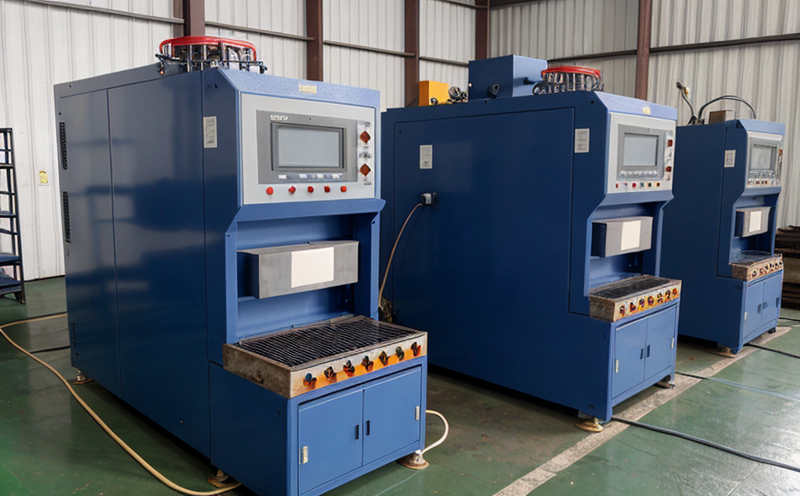DIN 51719 Coal Volatile Matter Testing
The DIN 51719 coal volatile matter test is a critical procedure used in the industrial manufacturing and processing sector to determine the volatile matter content of coal samples. This parameter provides crucial information regarding the quality, calorific value, and combustion behavior of coal, which are essential for optimizing fuel efficiency and ensuring compliance with industry standards.
The DIN 51719 test is widely used in sectors such as power generation, metallurgy, chemical processing, and mining. It helps manufacturers and processors to make informed decisions about the quality control measures needed for their raw materials, thereby enhancing product performance and reliability.
For industrial manufacturing facilities, understanding the volatile matter content of coal can significantly impact fuel consumption, emissions, and overall operational costs. This test plays a pivotal role in ensuring that the coal used meets stringent quality standards set by international regulations such as ISO 17842-3:2016 or ASTM D3951.
The testing process involves several steps including sample preparation, ignition, heating at specific temperatures, and measurement of weight loss. The accuracy of these measurements directly influences the reliability of the final results. Thus, it is essential to use state-of-the-art equipment and adhere strictly to standardized procedures like DIN 51719.
Compliance with such tests ensures that industrial facilities operate efficiently while minimizing environmental impacts. By providing accurate data on volatile matter content, this test supports sustainability goals by helping companies optimize their processes and reduce waste.
In summary, the DIN 51719 coal volatile matter test is indispensable for any facility dealing with coal-based fuels or raw materials. Its importance lies in its ability to provide precise measurements that contribute significantly towards maintaining high standards of product quality and operational efficiency.
Applied Standards
| Standard Number | Description |
|---|---|
| DIN 51719 | German standard for determining volatile matter in bituminous coal. |
| ISO 17842-3:2016 | International Organization for Standardization guideline applicable to solid fuels including coal. |
| ASTM D3951 | American Society for Testing and Materials standard covering methods of sampling and testing bituminous coal. |
| Instrumentation | Description |
|---|---|
| Balance | For weighing the sample before and after heating. |
| Drying Oven | To remove moisture from the coal sample prior to testing. |
| Volatile Matter Apparatus | A specialized device used for precise measurement of volatile matter during high-temperature heating. |
Benefits
The primary benefit of conducting DIN 51719 coal volatile matter testing is the ability to accurately assess the quality and suitability of coal for various industrial applications. This test enables companies to optimize their fuel usage, reduce costs, and improve environmental performance.
By ensuring that only high-quality coal enters production processes, firms can avoid costly downtime due to unsuitable raw materials. Furthermore, accurate testing helps in identifying potential issues early on, allowing timely corrective actions to be taken. This proactive approach not only enhances operational efficiency but also contributes positively towards sustainable business practices.
For quality managers and R&D engineers involved in coal-related projects, this test offers valuable insights into the physical properties of different types of coal. These data points can guide decisions related to sourcing strategies, process adjustments, and technological advancements aimed at improving productivity and reducing waste.
In addition to its technical advantages, compliance with standards like DIN 51719 also enhances a company's reputation among customers who value reliability and consistency in their supply chain partners. It demonstrates commitment to maintaining the highest levels of quality across all stages of production.
Overall, incorporating DIN 51719 coal volatile matter testing into routine practices ensures that industrial manufacturing facilities operate at peak performance while adhering to global best practices. This not only boosts competitiveness within competitive markets but also supports broader sustainability goals by promoting efficient resource utilization and reduced carbon footprints.
Competitive Advantage and Market Impact
The ability to accurately measure the volatile matter content of coal through DIN 51719 testing provides significant competitive advantages in several key areas:
- Enhanced Product Quality: Accurate data on volatile matter allows manufacturers to produce consistently high-quality products, which are essential for meeting customer expectations and maintaining brand loyalty.
- Cost Efficiency: By optimizing fuel consumption based on precise test results, companies can reduce operational expenses significantly. This cost savings translates directly into higher profit margins.
- Emission Reduction: Understanding the volatile matter content helps in identifying ways to minimize harmful emissions during combustion processes. This aligns with growing environmental regulations and contributes positively to corporate social responsibility initiatives.
- Innovation Opportunities: Knowledge gained from DIN 51719 testing can drive innovation by enabling researchers to develop new methods for improving coal quality or exploring alternative fuel sources.
The market impact of adopting DIN 51719 coal volatile matter testing extends beyond individual enterprises; it influences entire industries by fostering greater transparency and consistency in product offerings. As more companies embrace this standard, there will be increased pressure on suppliers to meet higher quality benchmarks, leading to overall improvement across the sector.
Moreover, adherence to international standards like DIN 51719 enhances a company's reputation among stakeholders—customers, investors, regulators—all of whom value reliability and consistency in their supply chains. This reputation-building aspect is particularly important given the global nature of many manufacturing operations today.
In conclusion, implementing DIN 51719 coal volatile matter testing represents an investment not only in technological advancement but also in long-term strategic positioning within competitive markets. Through enhanced product quality, cost efficiency, emission reduction, and innovation opportunities, companies gain a substantial edge over competitors who may lag behind in adopting these practices.





